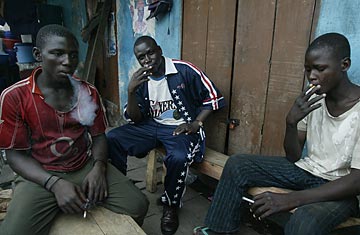
Three men smoke on a street in Lagos
(2 of 2)
What's more, though British manufacturers, like American ones, put warnings on cigarette packs, the labels do no good if a pack is something you never see. Like other antismoking activists, Irukera believes industry actively promotes single-stick sales (which also occur in Asia, the Americas and elsewhere in the world). But the companies answer that the matter is out of their hands. Says British American spokeswoman Catherine Armstrong: "If retailers choose to break [packs] up and sell them one at a time — which I believe is very widespread across Africa — that's not something we have any involvement with." Still, the sticks are getting out, and the companies are cashing in. According to Emmanuel James-Odiase, an antitobacco counselor in Nigeria, more than 200 teens in his country begin smoking every day.
Making it harder to contain those numbers is the fact that the same multinationals that are Africa's cigarette suppliers are also its benefactors. Tobacco companies have jumped into the corporate-social-responsibility game, doing all manner of benevolent work across Africa and Asia. In 2005, Philip Morris paid $5 billion to buy Indonesian cigarette-maker Sampoerna, a company that was already pouring money into scholarships for local students. British American does similar work in Malaysia, and in Nigeria has devoted 1% of its local profits to improving access to drinking water, health care and vaccines. That kind of largesse buys the companies a measure of indebtedness.
"It's hard to tell a village, 'You shouldn't accept these new wells or bicycles because it's from industry,' " says Stella Bialous, an adviser to the World Health Organization. "[But] when it comes time to pass regulatory things the company doesn't think reasonable, they can call in their chips. They have all these little groups dependent on their money."
In some cases, those "little groups" include the government. In 2007 the Nigerian Customs Service signed an agreement with British American to work jointly on curbing the unlicensed tobacco trade — which diverts profits from industry. The company courted the government two years earlier, with a three-day retreat at a local resort. "It's not the industry's job to be in charge of government policy," says Bialous.
But Nigeria and Africa as a whole are starting to push back. In 2003 the World Health Assembly adopted the Framework Convention on Tobacco Control, a treaty designed to attack smoking through a mix of methods including bans and tax hikes. So far, 164 countries have joined the pact, including 48 in Africa. The U.S. signed the treaty in 2004 but has yet to implement it, though the President is expected to seek Senate ratification soon, adding a very big player to the team.
If such antismoking strategies are to succeed, health experts warn that speed is essential. "The challenge for Africa is to adopt policies to reduce tobacco use before the epidemic sweeps across the continent," says Matthew Myers, president of the Campaign for Tobacco-Free Kids. To that end, Nigeria is taking a page from the West's playbook, filing a $45 billion damages suit against British American, Philip Morris and the domestic firm International Tobacco, alleging what Irukera calls a "clear strategy to market their products to young people." The tobacco companies deny the charge.
For all the efforts of the lawyers, doctors and treaty writers, it's at the grass roots that the fight against tobacco will be won. On a hot Friday afternoon not long ago, a group of students in blue-and-yellow uniforms gathered for a lecture at the Shepherd Secondary School in Ketu, a poor neighborhood in Lagos. "Have you seen anybody smoking on TV?" asks James-Odiase, the antitobacco counselor. The class nods, and one boy admits that he admires the way male actors look when they smoke. "With each puff he takes," the counselor warns, the actor's "life reduces by five seconds." The kids of Ketu — new to such things — gasp at that.
Later in the day, Salau Moshood, 17, reflects on what he's learned. "I heard today that smoking is not good, especially for children," he says. "My advice to the people is that they should stop." That advice may or may not be heeded, but health officials everywhere will count it as a win if Moshood himself and millions of other Africans never start.
— With reporting by Gilbert Da Costa / Lagos and Adam Smith / London
